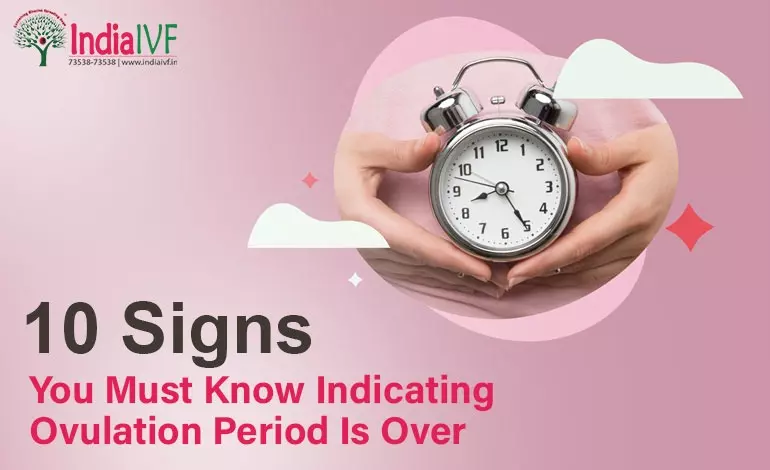Your cart is currently empty!



Grasping the delicate dance of your body’s reproductive cycle is paramount for anyone seeking to conceive or understand their fertility better. A critical part of this intricate ballet is the ovulation period, a time that is full of potential and laden with signs and signals if we know where to look. In this article, we aim to guide you through understanding the end of the ovulation period. This guide is brought to you by India IVF Fertility, a leading fertility clinic in Delhi, Noida, Gurgaon and Gwalior. Let’s unravel this mystery together!
Ovulation period refers to a time in a woman’s menstrual cycle when a mature egg is released from the ovary, journeying down the fallopian tube where it stands a chance of being fertilized by sperm. This period typically occurs around the middle of your cycle and is short-lived, lasting for about 12-48 hours. Recognizing the end of this period can be as vital as knowing when it starts. It not only helps in planning for a baby but is also essential for general health awareness.
Understanding when your ovulation period has ended can provide valuable insights into your fertility cycle. Here are the ten signs you must know:
During ovulation, your body tends to produce more cervical mucus that is clear and stretchy, much like egg whites. As the ovulation period ends, there is a notable decrease in the quantity of this mucus, and it becomes thicker and stickier.
Your basal body temperature experiences a slight but noticeable increase post-ovulation. Charting your basal body temperature daily can provide significant insights into your ovulation cycle.
During ovulation, many women experience a peak in their libido due to hormonal shifts. As ovulation ends, there is a considerable dip in this increased sexual desire.
Also known as “mittelschmerz,” some women experience a twinge of pain or a series of cramps in their lower abdomen at the end of ovulation.
A decline in the Luteinizing Hormone (LH) levels, which can be detected through OPKs, indicates that ovulation has occurred.
The hormonal roller coaster that accompanies ovulation can cause mood swings. As ovulation ends, these mood swings tend to subside.
If you’ve been tracking your menstrual cycle, you will notice that the end of ovulation brings you closer to the beginning of your next menstrual period.
Understanding your body and observing the signs mentioned above are effective ways to determine when your ovulation period has ended. Tracking changes in your cervical mucus, body temperature, and mood swings can provide useful clues. Utilizing Ovulation Predictor Kits (OPKs) can also be an accurate method to detect the shift in your Luteinizing Hormone (LH) levels.
Once ovulation is over, if the egg has not been fertilized, it will disintegrate or dissolve in the uterus. The hormone levels will drop, and the uterine lining will start to shed, leading to the menstrual period.
The probability of getting pregnant decreases significantly after ovulation is over. This is because the lifespan of the egg is relatively short, about 24 hours. However, sperm can live in the female reproductive tract for up to five days, which means if you had sexual intercourse in the days leading up to ovulation, you could still conceive after ovulation.
Understanding your ovulation period and recognizing when it ends can provide empowering insights into your fertility. The end of ovulation signifies the completion of a significant phase in the fertility cycle. It also means the commencement of a new cycle, marking the constant ebb and flow that characterizes female reproductive health.
Please note that this article is intended to serve as a guide and not a definitive medical advice. For personalized advice, consult with a healthcare professional.
Ovulation is a part of the menstrual cycle where a mature egg is released from the ovary to the fallopian tube, ready to be fertilized by sperm.
The chance of pregnancy decreases after ovulation is over. However, since sperm can live in the female reproductive tract for up to five days, if you had sex in the days leading up to ovulation, you could still conceive.
Signs that ovulation is over include changes in cervical mucus, a shift in basal body temperature, a reduction in libido, and subsiding mood swings.
The ovulation period is typically quite short, lasting around 12-48 hours.
You can track your ovulation period by observing changes in cervical mucus, tracking your basal body temperature, and using Ovulation Predictor Kits (OPKs).
Generally, only one ovulation occurs in each menstrual cycle. However, multiple ovulation, releasing more than one egg, can occur but they typically happen within 24 hours of each other.
While ovulation often occurs in the middle of your menstrual cycle, it can vary from woman to woman and from cycle to cycle.
Not always. Some women may have what appears to be a period, even if they have not ovulated, a condition known as anovulatory cycle.
An OPK can help you predict ovulation by detecting a surge in LH levels. However, it cannot confirm whether ovulation has actually occurred.
Yes, women can experience a period-like bleeding even if ovulation did not occur. This is called an anovulatory cycle.
At India IVF Clinics we provide the most comprehensive range of services to cover all the requirements at a Fertility clinic including in-house lab, consultations & treatments.